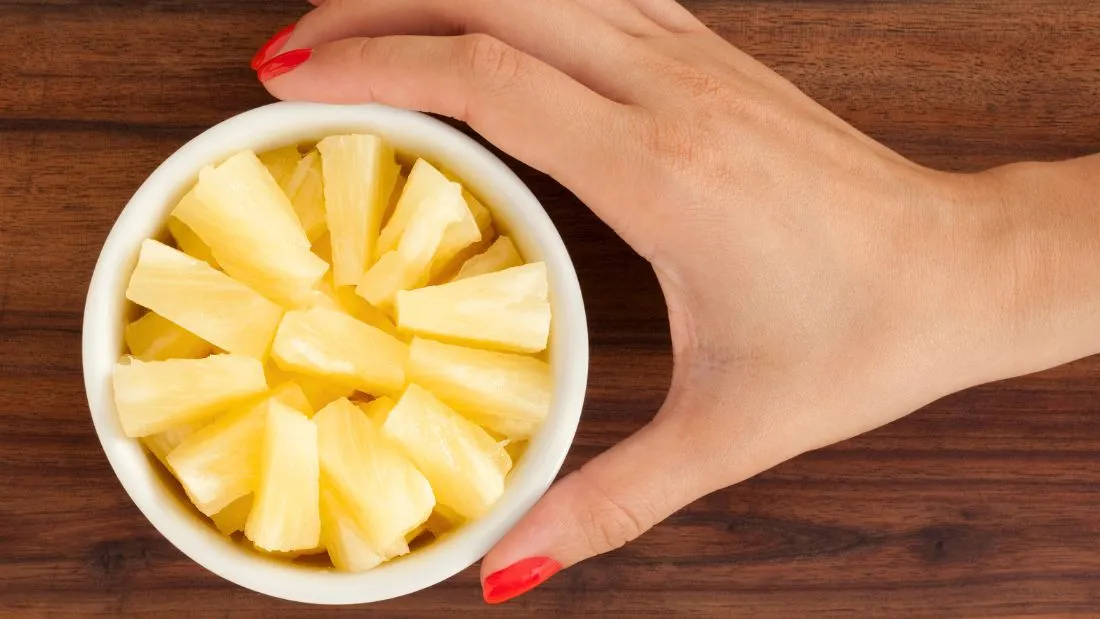Pineapple

Pineapple is a tropical shrub native to South America that’s been cultivated by indigenous populations since at least 1,200 BC. The fruit was first introduced to Europe in the 17th century and became a luxury, which led to its cultivation in large greenhouses in the 18th century – but it was only the richest who could afford it.
Pineapples are now grown across the world’s tropical regions and we can enjoy it fresh anytime because of refrigerated ship transportation. It does mean that the fruit will always have a larger carbon footprint than locally grown produce but it can be an occasional treat that comes with a wealth of health benefits.
Nutrients in pineapple
A cup of pineapple chunks (165 grams) provides healthy energy – packing 16 grams of natural sugars but it also supplies over two grams of fibre, which slows down sugar absorption and is excellent for your digestive system.
Pineapple contains almost no fat and very little protein but it does provide a range of vitamins and minerals. Just one cup of pineapple chunks contains almost 200 per cent of your daily vitamin C needs – a vitamin vital not just for your immune system but also for healthy skin, joints and the repair of all tissues. It also helps you to absorb more iron from food.
With other vitamins, pineapple supplies small amounts of B vitamins, vitamin K and beta-carotene – important for healthy eyesight and immune system.
A cup of pineapple will also cover 50 per cent of your recommended manganese intake – needed for healthy bones, skin, cartilage, nervous system and in sugar metabolism. On top of that, pineapple offers small amounts of other essential minerals such as calcium, magnesium, copper, potassium, iron and zinc.
Anyone who’s ever eaten raw pineapple knows that it’s bursting with juice, which means it has a high water content and so helps to keep you hydrated.
Pineapple phytochemical magic
Probably the best-known phytochemical found in pineapple is bromelain – a mixture of enzymes that help to break down protein and so aids your digestion. This explains why pineapple has traditionally been used to treat indigestion.
Bromelain also has strong anti-inflammatory properties but eating pineapple alone may not supply a large enough dose to be truly effective. Studies show that taking a bromelain supplement may help to reduce swelling, bruising, healing time and even pain after surgery or physical injuries and it seems particularly helpful in healing your face, sinuses, mouth and throat.
Bromelain may also be used to reduce inflammation and relieve pain from conditions such as osteoarthritis or tendinitis. In some people, its effect is the same as taking drugs used to treat the condition! Some studies report that it may also relieve the swelling and inflammation caused by hay fever but as this is a relatively new research area, more human studies are needed to investigate bromelain’s effects.
If you take blood thinners, beware – bromelain can increase their effect and raise the risk of bleeding. It prevents platelets from sticking together and forming blood clots. A piece of pineapple is fine but you should avoid bromelain supplements.
Pineapple is also rich in flavonoids and phenolic acids, two types of antioxidants that protect your cells and tissues from damage. Their regular consumption can help reduce your risk of heart disease and cancer.
Pineapple boosts your immune system
All the nutrients in pineapple have a remarkable effect on your immune system, with one study of schoolchildren showing that those who ate pineapple daily for nine weeks had fewer viral and bacterial infections. Even if they became ill, they recovered faster compared to children who ate no pineapple at all.
When the scientists involved looked at blood test results of the pineapple-eating children, they found that those who ate the most had nearly four times more disease-fighting white blood cells than the other children in the study.
Why does your mouth feel funny when eating a pineapple?
Fresh pineapple can make your mouth tingle, burn or feel itchy but it’s only a temporary effect caused by bromelain. Our tissues are made of protein and bromelain from pineapple breaks down protein so it ever-so-slightly disrupts the surface of your tongue and inner cheeks. It’s a short-lived sensation and doesn’t mean you’re allergic to pineapple.
Pineapple allergy
Pineapple allergy usually causes swelling, hives or trouble breathing. Chances are that if you have a latex allergy you will also be allergic to pineapple.
Dried pineapple benefits
Dried pineapple has lost most of its water content so its nutrients are more concentrated, making it a very nutritious snack! Just 100 grams of dried, unsweetened pineapple supplies a generous dose of all B vitamins (except B12) and beta-carotene, around 100 per cent of recommended daily vitamin C dose, over 20 per cent of your magnesium needs, 15 per cent of your potassium requirements and almost 10 per cent of your daily calcium and iron needs. Pretty impressive for a fruity snack!
Is tinned pineapple good for you?
The tinning process involves high heat which destroys many nutrients, including bromelain, and reduces the content of others, such as vitamin C. Tinned pineapple still offers some essential nutrients but it’s certainly less nutritious and less healthy than fresh or dried varieties. If you do use it, perhaps for a dessert, choose pineapple that’s tinned in water not syrup, to avoid eating more sugar than pineapple.
Ethical concerns
Pineapple plantations come with a host of issues, such as using large quantities of insecticides, resulting in health problems for the workers. Poor wages and sometimes deforestation also feature in pineapple production. It follows that choosing organic and Fair Trade certified pineapples is the best option – workers get fair wages and their health and the environment aren’t poisoned by chemicals.




